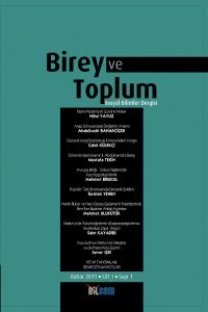Turkish “Foreign Policy” Towards the European Union Under AK Party Rule: From “Europeanization” to the “Alliance of Civilizations”
Poststructuralism, Foreign policy, Turkey-EU relations, Europeanization, Alliance of civilizations
___
- Anderson, Benedict (1983). Imagined Communities, London and New York: Verso.
- Ashley, Richard K. (1988). “Untying the Sovereign State: A Double Reading of Anarchy Problematique,”
- Millennium: Journal of International Studies, Vol. 17, No. 2, pp. 227-262.
- Biersteker, Th omas J. & Weber, Cynthia, (1996). eds., State Sovereignty as Social Construct, Cambridge: Cambridge
- University Press.
- Campbell, David (2010). “Poststructuralism,” in Tim Dunne, Milja Kurki, and Steve Smith, eds., International
- Relations Th eory, Oxford and New York: Oxford University Press.
- Devetak, Richard (1995). “Incomplete States: Th eories and Practices of Statecraft ,” in John Macmillan and
- Andrew Linklater, eds., Boundaries in Question: New Directions in International Relations, London and New York:
- Pinter Publishers.
- Edkins, Jenny & Persram Nalini and Pin-Fat,Veronique Sovereignty and Subjectivity, Colorado and London: Lynne
- Rienner Pub., 1999.
- Erdogan, Recep Tayyip (2004). “Açılış Konuşması [Keynote Speech],” Uluslararası Muhafazakarlık ve Demokrasi
- Sempozyumu [International Symposium on Conservatism and Democracy, UMDS], Ankara: AK Parti Yayınları.
- Hale, William and Ozbudun Ergun (2010). Islamism, Democracy, and Liberalism in Turkey: Th e Case of the AKP,
- New York: Routledge.
- Laclau, Ernesto and Mouff e, Chantal, (1985). Hegemony and Socialist Strategy, London: Verso.
- Weber, Cynthia (1995). Simulating Sovereignty, Cambridge: Cambridge University Press,
- ISSN: 2146-4634
- Yayın Aralığı: Yılda 2 Sayı
- Başlangıç: 2011
- Yayıncı: Bilgi Yolu Eğitim Kültür ve Sosyal Araştırmalar Merkezi: BİLSAM
Varlığın Cezbesinde Dil ve Hakikat -Nietzsche değinileriyle-
Zonguldak'ta Milli Mücadele Destekçisi Bir Müftü: Devrek Müftüsü Hacı Abdullah Sabri (Aytaç) Efendi
A Painful Quest for God The Pre-Conversion Moment of Augustine and Al-Ghazali
Gazalî Düşüncesinde Nominalizm ve Eşyanın Hakikatı Sorunu
İSLAM'DA ÇEVRE TEOLOJİSİNİN PRATİĞE YANSIMASI: ÇEVRE AHLAKI
John Searle, Zihnin Yeniden Keşfi,
KÜRESELLEŞMENİN ULUS DEVLET ÜZERİNDEKİ ETKİSİ
Selahaddin BAKAN, Gökhan TUNCEL
